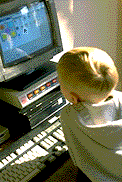

Computers have developed significantly over the years. Many people have influenced this change.
For most of Charles’ life he was determined to build his own calculating machine.
He asked,
and persuaded he British government to give him £17,000 for the project, (in
those days that was a very large sum of money!)
He also contributed £6,000 of his own money towards the project.
Babbage
worked hard on the new invention, but in the end he never finished it.
The main reason was that the machine that could be built at the time
was too clumsy for what Babbage wanted it to do. Charles Babbage is known as
‘the father of the modern computers’ today, because the original designs
for the computer were his idea.
Alan Turin
first developed the computer after Charles Babbage during the Second World
War. This was around 1945.
This was a long time after Charles Babbage.
One of the main reasons for this is that in those days, earlier on they
didn’t have the equipment they needed to build the suitable invention.
After Alan Turin carried on the design and came up with the idea of
artificial intelligence, the compute world had begun!
Over those
56 years the computer has developed in many different ways.
The people below have all contributed towards the computer you are
staring at now!
Jack Kilby – He co-invented the microchip, which played a big role in the development of computers.
Robert Noyce – He
was the other co-inventor of the microchip along with Jack Kilby.
Douglas C. Englebart – Pioneered in human – computer communications. He also developed the mouse, and graphical user interface.
Marcian Ted Hoff – He developed the microprocessor.
Gordon Bell – Helped develop the minicomputer.
Adam Osborne – He developed the computer even more by inventing the portable computer.
J.W. “Wild Bill” Stealy
– He developed computer games.
Bill Gates –
Designed the program Windows, so nowadays there are graphics, icons, and many
other technical designs.
If you
would like to read more about computers today, and how they have been developed
in more detail, then check out our Computers Today page!